比较级用法
比较级的用法比较级如何使用

比较级的用法比较级如何使用比较级就是将二者进行比较产生的词形,是由形容词原级转化而来的,那么比较级的使用方法有哪些呢?以下是由店铺整理关于比较级的用法的内容,希望大家喜欢!比较级的用法一般1. 表示"比...更"。
用比较级形容词+than+比较成分, than后主词的述语动词往往省略, 非正式用法的than后的人称代名词可用受格。
He is younger than me.他比我年轻。
I am a better swimmer than he(him).我游泳比他好。
2. 表示"较...低; 不及..."用less+原级形容词+than+比较成分。
I am less young than he (is).我不比他年轻。
3. 表示两者之中"较...", 用the+比较级+of the two。
This one is the bigger of the two houses.这所房子是两座房子中较大的。
4. 定冠词或指示形容词+比较级+名词表示比较。
The taller boy is John.那个身材较高的男孩子是约翰。
5. 有少数以ior结尾的形容词, 如inferior(次于), junior(年幼的;下级的), posterior(之后), prior(之前), senior(年长的,上级的), superior(优于)等本身就有比较的意思, 常与介系词to连用。
This method is superior to that one.这种方法优于那种方法。
6. 比较形容词可以被副词如a little(一点),much(得多), even(更加), still(更加), far(...的多)等修饰, 但不可用very修饰。
翻译: 现在的生活简单得多了。
(误)Life is very easier than it was twenty years ago.(正)Life is very much easier than it was twenty years ago.特殊1. no more… than… 与……一样不……not more…than… 没有……那样……,不如……not less… than… 不亚于……2.more than… 不止,仅仅,非常,极其This more than satisfied me.3.more than a little 非常4.not more than 不多于 no (not any) more than不过,仅仅5.no less than 有……之多,多达 not less than 至少,不下于6.neither more nor less than 恰好,不多不少,简直,和……完全一样7.better than 多于,超过 It is better than 20 km to the station.8.(in) less than no time 立即,一会儿9.(be) little/no better than 实际上,简直就是10.nothing less than 完全是,和……一模一样11.all the more 越发,更加12. any (the) less 较小/更小一些,小的13. all the better 更好,更加14. so much the better/worse (for sb./sth.) 甚至更好/更坏15. go one better (than sb./sth.) 胜过……一筹16. more…than… 与其说……不如说……17. would sooner/rather…than 与其……宁愿18. (be) more like…than 不像……倒像19. rather…than…/rather than 宁可……而不20. other than 除了……,除……之外。
比较级的各种用法

比较级的各种用法
1. 哎呀呀,比较级可以用来表示两者之间的比较呀!比如“他比我高”,这就是很直接地在说一个人和另一个人的身高差异呢。
2. 嘿,比较级还能强调程度的不同呢!就像“今天比昨天冷多了”,这样是不是很清晰地感受到了天气的变化更大呀?
3. 哇哦,它还可以用在竞争的情境中呢,比如说“他跑得比别人快”,这就凸显出他在跑步这件事上的优势呢。
4. 瞅瞅,比较级能让我们更准确地描述事物的变化,像“这个苹果比那个大一些”,一下就知道哪个苹果更大啦。
5. 诶呀,在选择的时候也能用到比较级呀,“这件衣服比那件好看”,那就很容易做出选择啦。
6. 哇,比较级可以表达进步或退步呢,“他这次考试的成绩比上次好多了”,这多让人开心呀!
7. 哈哈,它还能用来形容心情的不同呢,“现在的心情比刚才好多了”,情绪的变化就很明显啦。
8. 哎呀,生活中到处都在用比较级呀,“这个蛋糕比我上次做的成功”,是不是很有成就感呀!
我觉得比较级真的是超级实用呀,让我们的表达更加丰富和准确,大家一定要好好掌握哦!。
比较级的用法和归纳
比较级的用法和归纳一般来说,比较级用来表示两者之间的差异,它可以通过对比两个人或事物的其中一特征来表达一个更高或更低的程度。
比较级的用法可以分为以下几种情况:1. 单音节词加-er一般情况下,如果形容词是单音节词,可以直接在词尾加上-er构成比较级。
例如:tall(高)- taller(更高)、fast(快)- faster(更快)。
需要注意的是,有些单音节词在词尾只有一个辅音字母时,需要双写该辅音字母再加-er。
例如:big(大)- bigger(更大)、thin(瘦)- thinner(更瘦)。
2. 多音节词前加more多音节词以及少数双音节词的比较级形式是在前面加上more(或less)。
例如:beautiful(美丽)- more beautiful(更美丽)、careful(小心)- more careful(更小心)。
有些双音节词也可以直接加-er构成比较级,例如:clever(聪明)- cleverer(更聪明)。
3. 双音节词和部分多音节词用-er部分双音节词和多音节词可以直接在词尾加-er构成比较级。
例如:quiet(安静)- quieter(更安静)、silly(愚蠢)- sillier(更愚蠢)。
4. 短语同级用more(less), 不同级用more(less) than在进行比较时,有时需要比较两个短语的程度。
如果两个短语的程度相同,则使用more(或less)来表示同级别。
例如:He is more of afriend than a teacher(他更像朋友,而不是老师)。
如果两个短语的程度不同,则使用more(或less)than来表示不同级别。
例如:He is more intelligent than his brother(他比他弟弟更聪明)。
5.一些不规则比较级形式有一些形容词的比较级形式是不规则的,需要特别记忆。
例如:good (好)- better(更好)、bad(坏)- worse(更坏)、many(多)- more(更多)、little(少)- less(更少)。
比较级用法归纳

比较级用法归纳比较级用法归纳如下:1. 形容词比较级:在形容词前加上"-er"或者在形容词前加上"more"来构成比较级。
例如:bigger (更大的),more beautiful (更漂亮的)。
2. 副词比较级:在副词前加上"-er"或者在副词前加上"more"来构成比较级。
例如:faster (更快地),more slowly (更慢地)。
3. 不规则比较级:有些形容词和副词的比较级形式是不规则的,需要记忆。
例如:good (好的) — better (更好的),bad (坏的) — worse (更糟糕的)。
4. 两者比较:用"比较级+than"的结构来表示两者之间的比较关系。
例如:He is taller than his brother (他比他弟弟高)。
5. 表示最高级:在比较级前加上"the"和"est"或者在比较级前加上"the most"来构成最高级。
例如:the tallest (最高的),the most beautiful (最漂亮的)。
6. 修饰人或物:当比较级修饰人或物时,通常在比较级前加上"a little"、"a bit"、"much"、"far"、"a lot"等词来表示程度。
例如:a little taller (稍微高一点),far more interesting (更有趣得多)。
7. 表示递增或递减:使用"比较级+and"的结构来表示递增或递减的情况。
例如:The more you practice, the better you will become (你练习得越多,你就会变得越好)。
英语比较级的用法总结
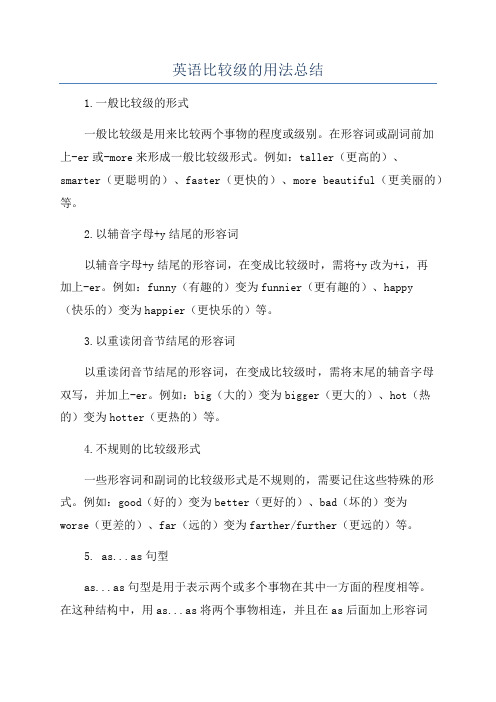
英语比较级的用法总结1.一般比较级的形式一般比较级是用来比较两个事物的程度或级别。
在形容词或副词前加上-er或-more来形成一般比较级形式。
例如:taller(更高的)、smarter(更聪明的)、faster(更快的)、more beautiful(更美丽的)等。
2.以辅音字母+y结尾的形容词以辅音字母+y结尾的形容词,在变成比较级时,需将+y改为+i,再加上-er。
例如:funny(有趣的)变为funnier(更有趣的)、happy(快乐的)变为happier(更快乐的)等。
3.以重读闭音节结尾的形容词以重读闭音节结尾的形容词,在变成比较级时,需将末尾的辅音字母双写,并加上-er。
例如:big(大的)变为bigger(更大的)、hot(热的)变为hotter(更热的)等。
4.不规则的比较级形式一些形容词和副词的比较级形式是不规则的,需要记住这些特殊的形式。
例如:good(好的)变为better(更好的)、bad(坏的)变为worse(更差的)、far(远的)变为farther/further(更远的)等。
5. as...as句型as...as句型是用于表示两个或多个事物在其中一方面的程度相等。
在这种结构中,用as...as将两个事物相连,并且在as后面加上形容词或副词的原级形式。
例如:She is as tall as her sister.(她和她妹妹一样高)6.比较级的用法比较级可以用来表达两个人或事物之间的差异或相似之处。
在句子中,比较级常常与than连用,表达一个事物在其中一方面比另一个事物更好或更差。
例如:He is taller than his brother.(他比他的兄弟更高)7.比较级的表示方法除了使用形容词或副词的比较级形式之外,还可以使用more或less加上形容词或副词的原级形式来表示比较级。
例如:He is more intelligent than his classmates.(他比他的同学更聪明)8.最高级的形式最高级是用来比较三个或三个以上人或物之间的级别或程度的形式。
比较级的用法
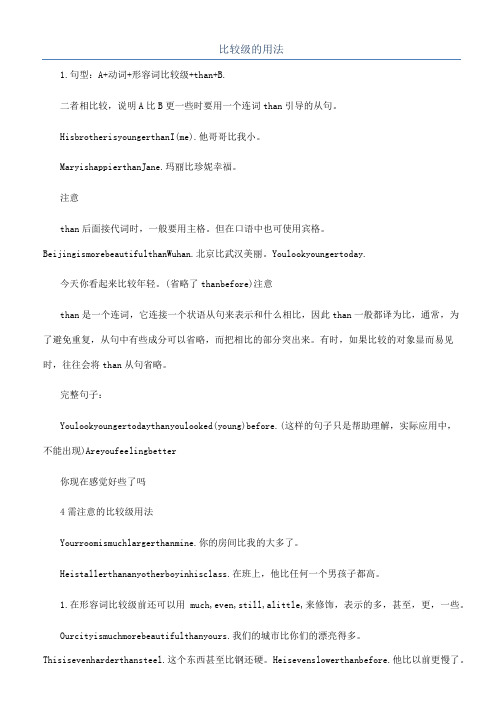
比较级的用法1.句型:A+动词+形容词比较级+than+B.二者相比较,说明A比B更一些时要用一个连词than引导的从句。
HisbrotherisyoungerthanI(me).他哥哥比我小。
MaryishappierthanJane.玛丽比珍妮幸福。
注意than后面接代词时,一般要用主格。
但在口语中也可使用宾格。
BeijingismorebeautifulthanWuhan.北京比武汉美丽。
Youlookyoungertoday.今天你看起来比较年轻。
(省略了thanbefore)注意than是一个连词,它连接一个状语从句来表示和什么相比,因此than一般都译为比,通常,为了避免重复,从句中有些成分可以省略,而把相比的部分突出来。
有时,如果比较的对象显而易见时,往往会将than从句省略。
完整句子:Youlookyoungertodaythanyoulooked(young)before.(这样的句子只是帮助理解,实际应用中,不能出现)Areyoufeelingbetter你现在感觉好些了吗4需注意的比较级用法Yourroomismuchlargerthanmine.你的房间比我的大多了。
Heistallerthananyotherboyinhisclass.在班上,他比任何一个男孩子都高。
1.在形容词比较级前还可以用much,even,still,alittle,来修饰,表示的多,甚至,更,一些。
Ourcityismuchmorebeautifulthanyours.我们的城市比你们的漂亮得多。
Thisisevenharderthansteel.这个东西甚至比钢还硬。
Heisevenslowerthanbefore.他比以前更慢了。
JapanisalittlelargerthanGermany.日本只比德国大一点儿。
3.表示大三岁,高二厘米时要用《表示数、量的词+比较级》来表示。
Imtwoyearsolderthanyou.我比你大二岁。
比较级的用法
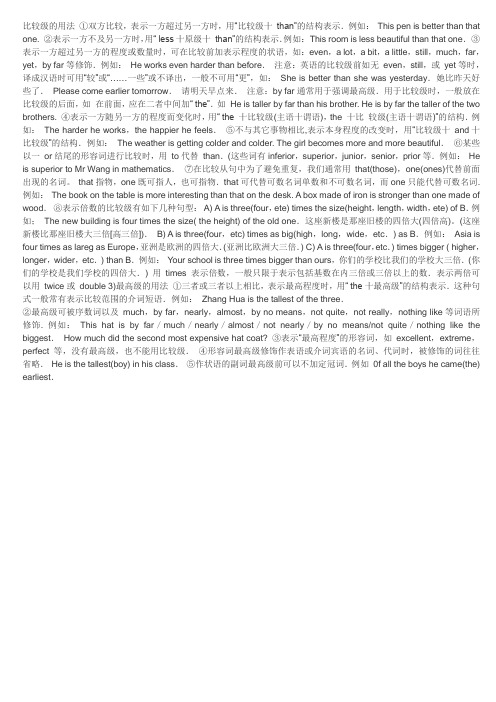
比较级的用法①双方比较,表示一方超过另一方时,用“比较级十than”的结构表示.例如:This pen is better than that one. ②表示一方不及另一方时,用“ less十原级十than”的结构表示.例如:This room is less beautiful than that one.③表示一方超过另一方的程度或数量时,可在比较前加表示程度的状语,如:even,a lot,a bit,a little,still,much,far,yet,by far等修饰.例如:He works even harder than before.注意:英语的比较级前如无even,still,或yet等时,译成汉语时可用“较”或“……一些”或不译出,一般不可用“更”,如:She is better than she was yesterday.她比昨天好些了.Please come earlier tomorrow.请明天早点来.注意:by far通常用于强调最高级.用于比较级时,一般放在比较级的后面,如在前面,应在二者中间加“ the”.如He is taller by far than his brother. He is by far the taller of the two brothers. ④表示一方随另一方的程度而变化时,用“ the 十比较级(主语十谓语),the 十比较级(主语十谓语)”的结构.例如:The harder he works,the happier he feels.⑤不与其它事物相比,表示本身程度的改变时,用“比较级十and十比较级”的结构.例如:The weather is getting colder and colder. The girl becomes more and more beautiful.⑥某些以一or结尾的形容词进行比较时,用to代替than.(这些词有inferior,superior,junior,senior,prior等.例如:He is superior to Mr Wang in mathematics.⑦在比较从句中为了避免重复,我们通常用that(those),one(ones)代替前面出现的名词。
比较级的六种用法结构

比较级的六种用法结构比较级是英语中非常重要的语法结构之一,它用来比较两个或多个物品、人或情况,表达出它们在某方面的差异。
比较级的使用非常灵活,可以通过多种结构来表达,本文将介绍六种常见的比较级用法结构,希望能够帮助读者更好地掌握这一语法点。
一、形容词或副词比较级1.1 基本结构形容词或副词的比较级通常由"比较级+than"的结构构成,表示"比……更……"的含义。
例如:Tom is taller than his brother.1.2 双音节和多音节形容词的比较级对于双音节和多音节形容词,比较级的构成通常要在形容词前加上more。
例如:The weather in London is more unpredictable than in Madrid.1.3 不规则的比较级形式有一些形容词和副词的比较级形式是不规则的,比如good会变为better,bad会变为worse。
例如:Your performance was better than I expected.二、as...as结构2.1 基本结构as...as结构用来表示两者在某一方面的程度相同。
例如:He is as tall as his father.2.2 否定形式as...as结构也可以用于否定形式,表示两者在某一方面的程度不同。
例如:She is not as tall as her sister.三、not as/so...as结构3.1 基本结构not as/so...as结构用来表示两者在某一方面的程度不同。
例如:This book is not as interesting as the one I read last week.3.2 as...as和not as/so...as的区别as...as结构表示两者在某一方面的程度相同,而not as/so...as结构则表示两者在某一方面的程度不同。
英语比较级用法
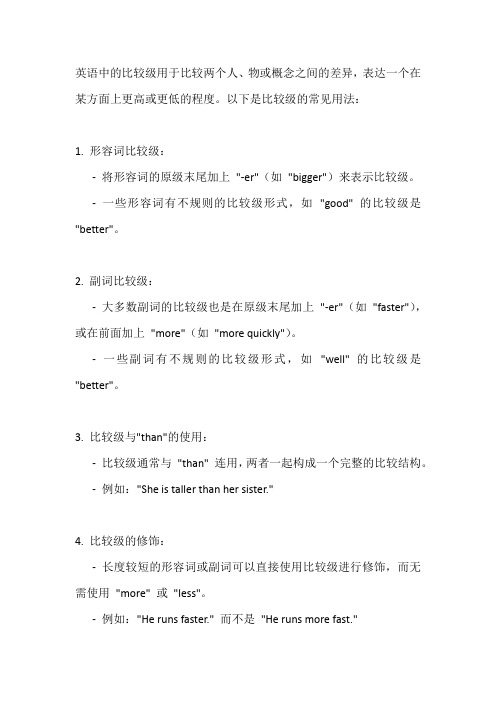
英语中的比较级用于比较两个人、物或概念之间的差异,表达一个在某方面上更高或更低的程度。
以下是比较级的常见用法:1. 形容词比较级:-将形容词的原级末尾加上"-er"(如"bigger")来表示比较级。
-一些形容词有不规则的比较级形式,如"good" 的比较级是"better"。
2. 副词比较级:-大多数副词的比较级也是在原级末尾加上"-er"(如"faster"),或在前面加上"more"(如"more quickly")。
-一些副词有不规则的比较级形式,如"well" 的比较级是"better"。
3. 比较级与"than"的使用:-比较级通常与"than" 连用,两者一起构成一个完整的比较结构。
-例如:"She is taller than her sister."4. 比较级的修饰:-长度较短的形容词或副词可以直接使用比较级进行修饰,而无需使用"more" 或"less"。
-例如:"He runs faster." 而不是"He runs more fast."5. 比较级的限定词:-有时,我们会使用比较级来修饰名词,并加上限定词(如"the" 或"my")。
-例如:"He is the tallest person in the room."6. 表示差距较大的比较级:-为了表示比较级之间的差距较大,可以在比较级前加上"much" 或"far"。
-例如:"It's much colder today."需要注意的是,有些形容词和副词的比较级形式与原级相同(如"clever"),或者是绝对形式,无法进行比较(如"perfect")。
比较级的六种用法结构

比较级的六种用法结构比较级在英语中是一个非常常见且重要的语法结构,用来比较两个物品、人或者情况之间的差异。
比较级的用法非常灵活,可以用在不同的句子结构中,以表达不同的比较关系。
接下来我们将重点讨论比较级的六种常见用法结构,让我们一探究竟。
1. 比较级 + than比较级 + than 结构表示一个物品、人或情况比另一个更高一些,更大一些,更好一些等。
这种结构通常用来表达物品的物理或者定性特征的比较。
例如:- The car is faster than the bicycle.- She is taller than her sister.- This restaurant is better than the one we went to last week.2. The + 比较级 + of (两者之中的更……之一)The + 比较级 + of 结构用来表示两个人或物中的一个(不论指定的是增减或状态)比另一个更……之一。
例如:- John is the smarter of the two brothers.- This is the more expensive of the two dresses.- This sandwich is the tastier of the two.3. 比较级 + than ever before比较级 + than ever before 结构表示某一物质或情况的水平高于之前的水平。
例如:- The new phone is faster than ever before.- She is more confident now than ever before.- The pollution in this city is worse than ever before.4. 越来越 + 比较级越来越 + 比较级结构用来表达某一物质或情况的水平不断增加。
比较级的用法归纳
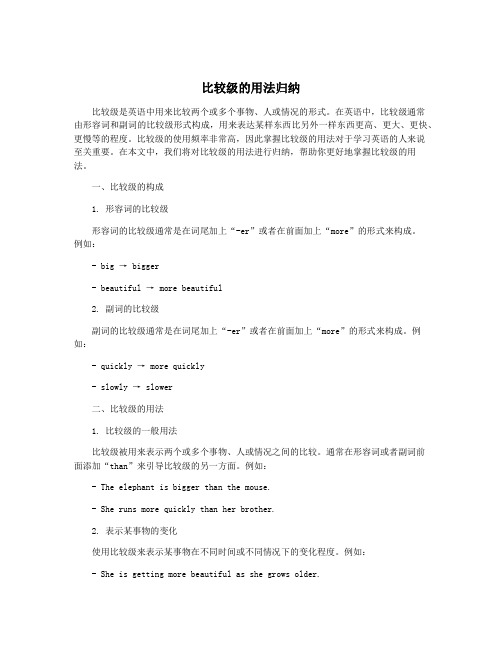
比较级的用法归纳比较级是英语中用来比较两个或多个事物、人或情况的形式。
在英语中,比较级通常由形容词和副词的比较级形式构成,用来表达某样东西比另外一样东西更高、更大、更快、更慢等的程度。
比较级的使用频率非常高,因此掌握比较级的用法对于学习英语的人来说至关重要。
在本文中,我们将对比较级的用法进行归纳,帮助你更好地掌握比较级的用法。
一、比较级的构成1. 形容词的比较级形容词的比较级通常是在词尾加上“-er”或者在前面加上“more”的形式来构成。
例如:- big → bigger- beautiful → more beautiful2. 副词的比较级副词的比较级通常是在词尾加上“-er”或者在前面加上“more”的形式来构成。
例如:- quickly → more quickly- slowly → slower二、比较级的用法1. 比较级的一般用法比较级被用来表示两个或多个事物、人或情况之间的比较。
通常在形容词或者副词前面添加“than”来引导比较级的另一方面。
例如:- The elephant is bigger than the mouse.- She runs more quickly than her brother.2. 表示某事物的变化使用比较级来表示某事物在不同时间或不同情况下的变化程度。
例如:- She is getting more beautiful as she grows older.- The traffic is getting worse as the day goes on.3. 表示程度的增加或减少比较级也可以用来表示程度的增加或减少。
例如:- The weather is getting colder and colder.- My English is becoming better with more practice.4. 表示对比比较级也可以用来表示对比,强调某一个事物相对另一个事物的不同之处。
比较级,比较级的用法

比较级,比较级的用法比较级是英语中用来比较两个事物、人物或概念之间差异和相似之处的一种语法形式。
通过使用比较级,我们可以描述出某个事物相对于其他事物在某个方面上的高低、多少或程度等信息。
在本文中,我们将详细探讨比较级的用法以及一些常见的结构和例句。
一、基本用法1. 比较级用来比较两个人或事物之间的性质、特征或状态。
例如:- She is taller than her brother.(她比她兄弟高。
)- This book is more interesting than the one I read yesterday.(这本书比我昨天看的那本有趣。
)2. 比较级通常由形容词与 "-er" 后缀组成,习惯上也可由副词加 "more" 构成。
例如:- The car is faster than the bicycle.(汽车比自行车快。
)- He spoke more confidently in front of a large audience.(他在大庭广众之前更自信地讲话。
)3. 在使用形容词时,需要注意音节数变化和规则变化。
- 单音节形容词:直接在后面加 "-er" 形成比较级。
例如:big - bigger(大 - 更大),tall - taller(高 - 更高)- 双音节形容词:在前面加 "more" 形成比较级。
例如:modern - more modern(现代 - 更现代),simple - more simple(简单 - 更简单)- 部分双音节形容词和多音节词也可以使用 "-er" 形式。
例如:clever - cleverer 或 clever(聪明的 - 更聪明的),gentle - gentler 或gentle(温和的 - 更温和的)二、特殊用法1. 某些形容词及副词应用不规则变化形式。
比较级的六种用法结构 -回复

比较级的六种用法结构-回复比较级的用法结构有很多种,根据不同的语境和场景,可以灵活运用。
以下将逐步解释六种常见的比较级用法结构,并给出示例和解析。
1. 形容词/副词+ 比较级+ than...这种结构用于进行两个对象或主题的比较,强调其中一方相对另一方更具有某种质量或性质。
例句:- She is taller than her sister.(她比她妹妹高。
)- This phone runs faster than the old one.(这部手机比旧手机运行得更快。
)解析:这种结构中,形容词或副词的比较级在句中作为修饰词,用于说明两个主题之间在某个方面的差异。
2. The + 比较级, the + 比较级这种结构用于表示随着一方的变化,另一方也相应发生变化的关系。
例句:- The more you practice, the better you will get.(你练习得越多,表现就会越好。
)- The earlier you arrive, the more choices you will have.(你越早到,你会有更多的选择。
)解析:两个比较级分别放在"The more...,the more..."的结构中,表示两者之间的因果关系或相关性。
第一个比较级表示因,第二个比较级表示果。
3. 比较级+ and + 比较级这种结构用于描述某个对象具备两种或多种质量或性质。
例句:- The film is funny and interesting.(这部电影既好笑又有趣。
)- The new car is fast and comfortable.(新车快且舒适。
)解析:通过使用并联连词"and"将两个比较级连接起来,来表示两种或多种品质的组合。
4. 比较级+ than ever before这种结构用于表示某种质量或性质的增强或程度的提高。
例句:- I am busier than ever before.(我比以往更忙。
比较级的用法(整理版)
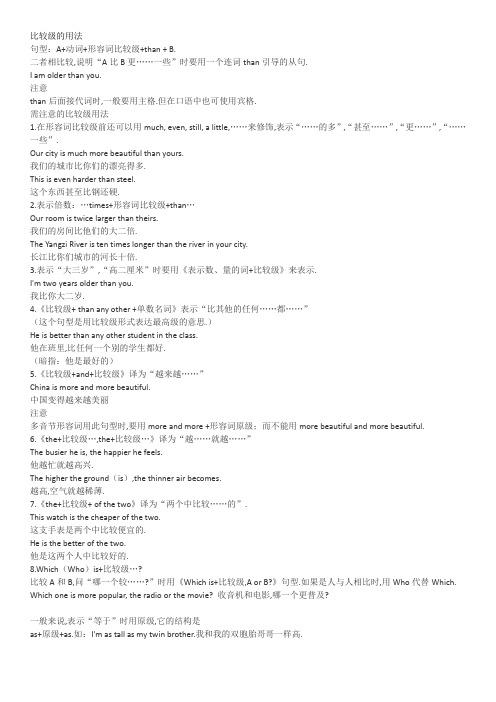
比较级的用法句型:A+动词+形容词比较级+than + B.二者相比较,说明“A比B更……一些”时要用一个连词than引导的从句.I am older than you.注意than后面接代词时,一般要用主格.但在口语中也可使用宾格.需注意的比较级用法1.在形容词比较级前还可以用much, even, still, a little,……来修饰,表示“……的多”,“甚至……”,“更……”,“……一些”.Our city is much more beautiful than yours.我们的城市比你们的漂亮得多.This is even harder than steel.这个东西甚至比钢还硬.2.表示倍数:…times+形容词比较级+than…Our room is twice larger than theirs.我们的房间比他们的大二倍.The Yangzi River is ten times longer than the river in your city.长江比你们城市的河长十倍.3.表示“大三岁”,“高二厘米”时要用《表示数、量的词+比较级》来表示.I'm two years older than you.我比你大二岁.4.《比较级+ than any other +单数名词》表示“比其他的任何……都……”(这个句型是用比较级形式表达最高级的意思.)He is better than any other student in the class.他在班里,比任何一个别的学生都好.(暗指:他是最好的)5.《比较级+and+比较级》译为“越来越……”China is more and more beautiful.中国变得越来越美丽注意多音节形容词用此句型时,要用more and more +形容词原级;而不能用more beautiful and more beautiful.6.《the+比较级…,the+比较级…》译为“越……就越……”The busier he is, the happier he feels.他越忙就越高兴.The higher the ground(is),the thinner air becomes.越高,空气就越稀薄.7.《the+比较级+ of the two》译为“两个中比较……的”.This watch is the cheaper of the two.这支手表是两个中比较便宜的.He is the better of the two.他是这两个人中比较好的.8.Which(Who)is+比较级…?比较A和B,问“哪一个较……?”时用《Which is+比较级,A or B?》句型.如果是人与人相比时,用Who代替Which. Which one is more popular, the radio or the movie? 收音机和电影,哪一个更普及?一般来说,表示“等于”时用原级,它的结构是as+原级+as.如:I'm as tall as my twin brother.我和我的双胞胎哥哥一样高.比较级和最高级有规则变化和不规则变化两种.1) 规则变化单音节词和少数双音节词,加词尾-er,-est来构成比较级和最高级.构成法原级比较级最高级一般单音节词tall(高的) taller tallest未尾加-er,-est great(巨大的) greater greatest以不发音的e结尾nice(好的) nicer nicest的单音词和少数large(大的) larger largest以- le结尾的双able(有能力的) abler ablest音节词只加-r,-st以一个辅音字母big(大的) bigger biggest结尾的闭音节单hot热的) hotter hottest音节词,双写结尾的辅音字母,再加-er,-est"以辅音字母+y" easy(容易的) easier easiest结尾的双音节词,busy(忙的) busier busiest改y为i,再加-er,-est少数以-er,-ow clever(聪明的) cleverer cleverest结尾的双音节词narrow(窄的) narrower narrowest未尾加-er,-est其他双音节词和important(重要的)多音节词,在前more important面加more,most most important来构成比较级和easily(容易地)最高级. more easilymost easily2) 不规则变化原级比较级最高级good(好的)/ better bestwell(健康的)bad (坏的)/ worse worstill(有病的)old (老的) older/elder oldest/eldestmuch/many(多的) more mostlittle(少的) less leastfar (远的) farther/further farthest/furthest注:有些形容词一般没有比较等级。
比较级的六种用法结构

比较级的六种用法结构比较级是英语中用于比较两个事物之间优劣、大小、程度等差异的形式之一。
它在句子中的使用多种多样,包括修饰形容词、副词、名词等等。
下面将介绍比较级的六种用法结构,更好地理解和使用比较级。
一、比较级+than这是比较级最基本的用法,在其后加than引出进行比较的对象。
比如:1. He is taller than his brother.2. My cat is friendlier than yours.二、as...as这个结构用来表示两个事物在某一方面的相似程度。
形容词或副词用一般形式,前面加上as。
例如:1. The movie is as interesting as the book.2. She sings as beautifully as a bird.三、the + 比较级, the + 比较级这种结构用来表示随着一个问题的增加或减少,另一个问题也会相应增加或减少。
比如:1. The more you practice, the better you will get.2. The harder she works, the more successful she becomes.四、Less + 比较级, than这种结构是用来表示某种程度上相对于另一种程度的不足。
比如:1. The food is less tasty than I had expected.2. He is less talented than his sister.五、Not as + 比较级 + as用来表示两者在某一方面上的不同程度。
比如:1. This dress is not as expensive as that one.2. The weather is not as sunny as yesterday.六、A比较级, B比较级这种结构常用来进行两个事物的比较,强调两者相比较的不同程度。
比较级的用法知识点总结

比较级的用法知识点总结比较级是英语中一种重要的语法形式,用来表示比较两个事物或人的特征、性质、程度等,并确定它们之间的差异。
在英语中,一般利用形容词和副词的比较级形式来表达这种差异。
本文将对比较级的用法进行详细总结。
1. 构成比较级:比较级通常是在形容词和副词前加上-er或-more。
例如:taller (更高的)、smarter(更聪明的)、more carefully(更仔细地)。
但也有一些特殊的比较级形式,如good-better(好-更好的)、bad-worse(坏-更坏的)等。
2. 比较级的用途:比较级可以用于以下几种情况:- 对两个人或物进行比较:Tom is taller than Jerry.(汤姆比杰瑞高。
)- 表示与预期不符合的结果:This book is more difficult than I expected.(这本书比我预期的更难。
)- 表示程度或能力的提高或降低:He speaks English more fluently than before.(他现在说英语更流利了。
)- 表示两个动作同时发生:She sings better while dancing.(她在跳舞时唱歌更好。
)3. 比较级的结构:在比较级句子中,通常会有一个连接词(如than)来引导比较对象,并给出参照物。
例如:Alice is taller than Bob.(爱丽丝比鲍勃高。
)另外,有些形容词和副词的比较级形式是不规则的,如good-better(好-更好的)、bad-worse(坏-更坏的)。
需要记住这些不规则的形式。
4. 比较级与最高级的对比:比较级和最高级是并列的两种语法形式,它们在表示程度上有所区别。
比较级常用来比较两个人或物之间的差异,而最高级则表示整体中的最高水平或程度。
例如:I am taller than my brother.(我比我的哥哥高。
)但当我们要表示一个人或物在整个群体中处于最高水平时,我们需要使用最高级形式,例如:He is the tallest person in the class.(他是班级里最高的人。
比较级的用法
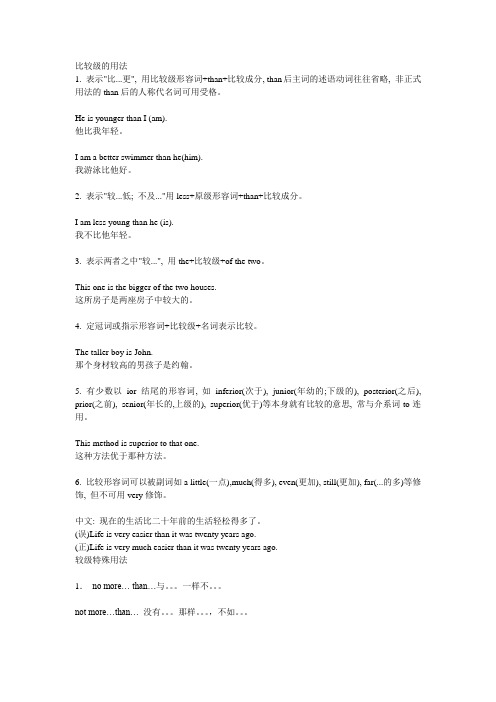
比较级的用法1. 表示"比...更", 用比较级形容词+than+比较成分, than后主词的述语动词往往省略, 非正式用法的than后的人称代名词可用受格。
He is younger than I (am).他比我年轻。
I am a better swimmer than he(him).我游泳比他好。
2. 表示"较...低; 不及..."用less+原级形容词+than+比较成分。
I am less young than he (is).我不比他年轻。
3. 表示两者之中"较...", 用the+比较级+of the two。
This one is the bigger of the two houses.这所房子是两座房子中较大的。
4. 定冠词或指示形容词+比较级+名词表示比较。
The taller boy is John.那个身材较高的男孩子是约翰。
5. 有少数以ior结尾的形容词, 如inferior(次于), junior(年幼的;下级的), posterior(之后), prior(之前), senior(年长的,上级的), superior(优于)等本身就有比较的意思, 常与介系词to连用。
This method is superior to that one.这种方法优于那种方法。
6. 比较形容词可以被副词如a little(一点),much(得多), even(更加), still(更加), far(...的多)等修饰, 但不可用very修饰。
中文: 现在的生活比二十年前的生活轻松得多了。
(误)Life is very easier than it was twenty years ago.(正)Life is very much easier than it was twenty years ago.较级特殊用法1.no more… than…与。
- 1、下载文档前请自行甄别文档内容的完整性,平台不提供额外的编辑、内容补充、找答案等附加服务。
- 2、"仅部分预览"的文档,不可在线预览部分如存在完整性等问题,可反馈申请退款(可完整预览的文档不适用该条件!)。
- 3、如文档侵犯您的权益,请联系客服反馈,我们会尽快为您处理(人工客服工作时间:9:00-18:30)。
比较级句式一、the+比较级, the+比较级此句型表示后者随着前者的变化而变化,意为“越……就越……”,前者相当于一个条件句,因此,要用一般现在时代替一般将来时。
如:1)The better I knew him, the more I liked him.我越了解他就越喜欢他。
2)The more difficult the questions are, the less likely I’ll be able to answer them.题目越难我越答不出。
二、the+比较级+of the two表示“两者中较…的那个人或物”时,在比较级前加定冠词the。
1)He is the taller of the two.他是两人中较高的那个。
2)She was the more promising worker of the two.她是两人之中更有培养前途的工人。
三、比较级+and+比较级此句型表示“越来越…”,单音节形容词或副词用“-er+and +-er”,如:1)Things are getting better and better every day.情况一天天好起来。
2)It’s becoming more and more difficult to finda job.找工作越来越困难了。
3)Holiday nights are getting less and less expensive.假日机票越来越便宜了。
四、not +比较级+ than / no +比较级+ than比较级前加not,表示前者不如后者,与not as…as相当;比较级前加no是对两者的否定,意为“和……一样不……”,与neither…nor…或“as+相反意义的形容词或副词+as”相当。
如:1)He is not taller than me. 他不如我高。
2)He is no taller than me. 他同我一样不高。
(即一样矮)3)His English is not better than mine.他的英语不如我的英语好。
4)His English is no better than mine.他的英语同我的英语一样不好。
(即一样差) 5)You are not more careful than he is.你不如他仔细。
6)You are no more careful than he is.你和他一样不仔细。
(即一样粗心)五、no more than与not more than两者均可表示数量,前者表示“仅仅”、“只不过”,强调少;而后者表示“不多于”、“至多”。
如:1)This test takes no more than thirty minutes.这个测验只需30分钟。
2)For thirty years, he had done no more than he had needed to.30年来,他只干了他需要干的工作。
3)He has not more than three children.他最多3 个孩子(有或许还不到3个之意)。
六、no more…than与not more…than两者均可用于比较,前者表示对两者都否定,意为“同……一样不”(=neither ... nor);而后者则指两者虽都具有某种特征,但程度不同,意为“不如”、“不及”(= not so ... as)。
如:1)He is no more a writer than a painter.他不是画家,也不是作家。
(= He is neither a painter nor a writer.)2)He’s no more able to read Spanish than I am.他和我都读不懂西班牙语。
(=Neither he nor I am not read Spanish.)3)She is not more clever than he is.她不如他聪明。
(= She is not so clever as he is.) 4)This book is not more difficult than that one.这本书不比那本书更难。
(This book is not so difficult as that one.)七、no less than 与not less than表示均可表示数量,前者意为“多达”、“有…之多”,强调多;后者表示“不下于”、“至少”。
如:1)He paid no less than $10,000 for it.他为此付了10000多美元。
2)He paid not less than $10,000 for it.他为此付的钱不下10000美元。
3)He walks no less than five miles to school.他上学至少要走五英里。
4)He has no less than seven daughters.他有七个女儿之多。
5)He has not less than seven daughters.他至少有七个女儿。
有时两者都可译为“至少”,但no less than语气比not less than要夸张,表示所涉及的数量比预料的要多,其用法可比较其反义结构no more than (只不过,只有),用于强调少。
八、no more …than 与no less…than前者意为“与…一样不”,否定两者;而后者则表示“和…一样”,肯定两者。
如:1)She’s no more a great singer than I am.他不是优秀歌手,我也不是。
2)Your brother is no less wise than you.你的兄弟跟你一样聪明。
3)A whale is no more a fish than a horse is.马不是鱼,鲸也不是鱼。
4)A dolphin is no less a clever animal than a dog is.海豚与狗同样都是聪明的动物。
九、less / least +原级“less+原级”表示降级的比较级;“least+原级”表示降级的最高级。
如:1)Would you mind speaking less quickly?你可否讲得慢一点?2)The movie was less funny than the book.电影没有书那么滑稽有趣。
3)This is the least useful of the four books.这是四本书中最没用的一本。
4)It is said that those who eat the most are theleast healthy.据说吃得最多的人身体最差。
十、less…than…的用法1. 本身用作比较级:把more看成many或much 的比较级,后接名词,表示“比…更多”。
如:Statistics show that there are more boys than girls at school. 统计数字表明学校的男生比女生多。
2. 后接多音节形容词和副词:more后接多音节形容词或副词,前后是两个或两类人或物进行比较时,表示“比……更”。
如:Airports were more closely watched than anyplace else. 飞机场比任何其他地方看守得更严密。
All human beings are much more intelligent than animals. 所有人类的智力都比动物高得多。
3. 对同一对象的两个方面进行比较:若是对同一个人或物在不同方面进行取舍时,意为“与其说……倒不如……”,此时,不论形容词或副词是单音节、双音节还是多音节,一律用more…than…。
如:1)He is more hungry than tired.与其说他累了,倒不如说他饿了。
2)I was more annoyed than worried.我与其说是着急,不如说是生气。
准确把握比较级的含义:1.The painting can be worse.2.I can’t agree more.3.It can’t be better.4.He is the last one I will work with.5.---How did you sleep last night?----Like a log. Never slept better.6.----How did you find last’s performance?-----Wonderful! I’ve never seen a better one.7.They couldn’t have done better.8.Boris has brains. In fact , I doubt whether anyone in class has ahigher IQ.9.----I’ve never found a better job.----————.A I don’t think so.B Too badC CongratulationsD Don’t worry.10.It is difficult to speak too severely.11.I can’t speak too highly of him.12.He would no more give up the dictionary thana boy would give up a new toy.。
